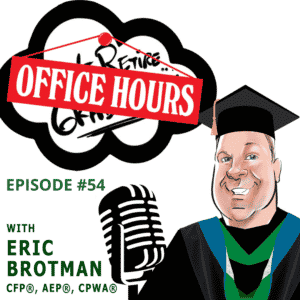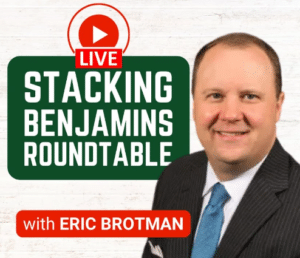In today’s Office Hours, Eric answers Jason’s question: “what are a few basic aspects of a financial plan that I can create myself?”
The truth is, you can do it all yourself or with the help of a few vendors. A financial planner is not necessarily needed. But which way is right for you?
Have a question? Post it in the comments, tweet it to us at @BrotmanPlanning, or post it on our Facebook and it may be used in a future episode of Office Hours!
[00:00:00] Eric Brotman: This is Eric Brotman, the host of Don’t Retire… Graduate!: The podcast that teaches you how to advance into retirement rather than retreating. Welcome to office hours where we answer listeners’ questions about personal finance, retirement readiness, and more. We received a question from Jason who asked “what are a few basic aspects of a financial plan that I can create myself?”
Terrific question. I like this one. And, and the reality is you can create every aspect of a financial plan yourself. If you’re a do-it-yourselfer and you’d like to do this, there’s nothing in financial planning that can’t be done on your own. All right. And I know I say that as a financial advisor, who makes a living working with people who don’t want to do this themselves, but let me explain what I mean.
I’m not a neuroscientist. This is not surgery. Everything in a financial plan can be created using various vendors, various software, various technology. And it’s a lot of it is basic math. Here’s the challenge: when you do it yourself, you don’t have an accountability partner and therefore you don’t necessarily have an objective set of eyes on everything you’re doing, on the decisions you’re making, and someone who really knows all the ins and outs.
So for example, when you’re starting a financial plan, you might start with say your employee benefits. And if you’ve gotten your employee benefits package lately, it might be a hundred pages long. Now you can read it and digest it and make a decision about your health insurance and your disability coverage and how much life insurance to get and who to name as a beneficiary and you can do all of those things yourself. Whether it makes sense to do so or not really depends on you. It depends not only on your ability and your acumen and your interest in doing that, but also in the time you have to take care of these various things. They all have deadlines. They all have, they all have limits and things that you need to keep up on.
So the next piece of your financial plan might be a basic budget. You can do that with a spreadsheet. You can do it with a yellow pad. You can do it with a piece of software. You figure out what’s coming in and what’s going out and do you have positive cash flow and so forth? So you don’t need a financial advisor to tell you that you’re spending too much on dining out.
In fact, I don’t like to give anyone a budget. I consider budgeting the B word and would much rather just calculate how much needs to be put away for your long-term savings to get you to financial independence so that you don’t, you can choose what to spend everything else on yourself, Jason. Now all of these aspects of a plan, whether it’s cash management or debt management or reduction, or retirement planning, estate planning, insurance work, all of these various things, you can do yourself.
I do think that there’s a benefit to having accountability partners. And I think it’s important to have what I like to refer to in the, in “don’t retire… graduate” the book, I talk about the dream team. This idea that you’re getting financial and legal and tax advice from three different organizations, three different firms, but that they know what one another are doing because in a perfect world, you need all of your specialists to understand what the plan is. Think of it like if your financial advisor is your primary care physician, you want your primary care physician to know all the various medical specialists you’re seeing and why, so that you can have a comprehensive care plan. Financially that’s the same. You can do this yourself, or you can hire someone like us to do that.
Think about a general contractor for a minute. If you were going to do a project in your backyard, you’re going to do a landscaping project. Maybe you’re putting in a new deck and a patio and some, and some bushes and some other things and doing some tree work. You can do this yourself. You can either A: do the work yourself which very few people will do, but some will, or you can just be the general contractor and say, all right, I’m hiring this tree company and this lawn company and this deck company, and I’m going to herd all these cats and put them all together. Or you can hire a general contractor to say, we’re bringing in these subcontractors, we’re going to get it done.
So essentially you have three ways to do the project. You can fully do it yourself, where you’re out there cutting hedges, or you can be the general and decide on all the various pieces and who the subs are going to be and let them do the work, or you can hire the general entirely. So to me, a financial plan and a certified financial planner is that general contractor, the primary care physician for you financially.
We’re the ones who are going to come in and say, here’s the big picture. Here’s the plan. Here are the specialists you need. We need to get you an insurance agent or a mortgage broker or a real estate agent or an attorney or an accountant or a banker or any of these other kinds of things. And we want to coordinate your human resources with your, with the beneficiaries that are named in your will and all these various pieces.
None of that is impossible to do by yourself. In the same way. It’s not impossible to change your own tire. It’s not impossible to build your own deck. Heck it’s not impossible to build your own house. There are people who can and who do. So, jason, I love your question. The reality is every aspect of a financial plan can be done on your own if you want to do it. It can also be done with the help of one or more vendors or contractors. Or you can hire someone to handle the big picture and take care of the whole process for you and make sure that all of the individual pieces make sense together. And that’s why I believe that there’s a strong desire for a lot of people to have certified financial planner practitioners who can take a look at that big picture and sort of handle this project and can be the one person or one organization you need to talk to about all those moving pieces.
So, Jason, thank you for your question. I wish you incredible good fortune with your financial planning, whether you do it yourself or whether you hire a firm like ours. It was a terrific question. I hope I answered it for you in a way that was helpful. If you’d like to send us a question, which we might answer in a future episode of office hours posted on our Facebook page or tweet us at @BrotmanPlanning.
If you like what you hear, please subscribe to our podcast and leave a rating on Spotify or wherever you listen to your favorite shows. Please also check out our books, workbooks and online financial literacy resources at brotmanmedia.com. Thanks for coming to office hours. Be sure to tune in for new content every Thursday. For now, this is your host, Eric brotman reminding you: don’t retire. Graduate!
[00:06:20] Narrator: Securities offered through Kestra investment services, LLC, Kester IS. Member, FINRA SIPC investment advisory services offered through Kestra advisory services, LLC. Kestra AS an affiliate of Kestra IS. Kestra IS or Kestra AS are not affiliated with Brotman financial or any other entity discussed.







